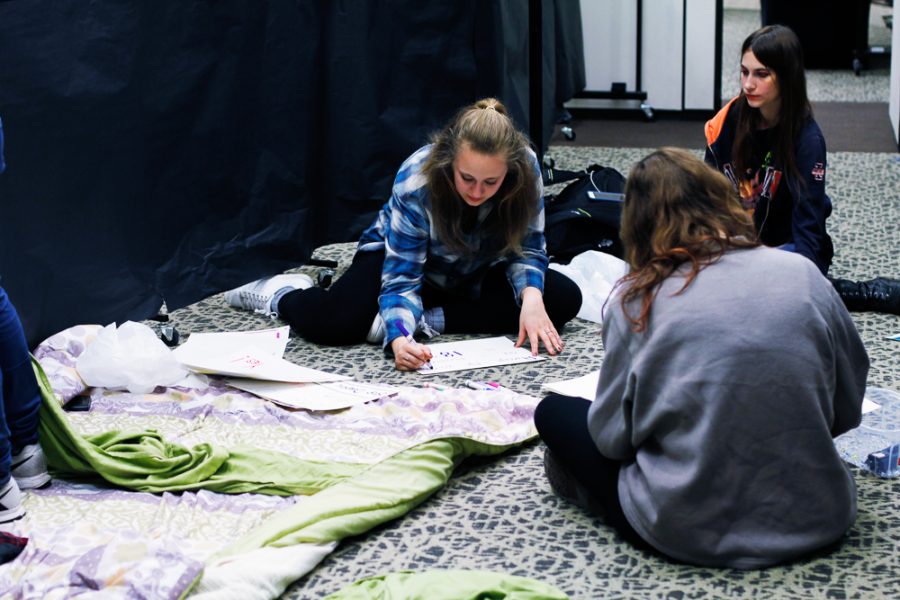University’s Tunnel of Oppression sheds light on campus hardships
Students making preparations for the Tunnel of Oppression event on the second floor of the Ikenberry Commons on Nov. 13.
November 15, 2016
The University is hosting its eighth annual Tunnel of Oppression Nov. 14 p.m. to 17 p.m. from 5 p.m. to 8 p.m. on the second floor of the Ikenberry Commons in the SDRP Multipurpose Rooms 2025 A-C as a way to inform students of the oppressions minorities face on campus.
The Tunnel of Oppression, a nationwide social justice experience, takes small groups of students through six paper-constructed tunnels where they listen to stories and watch skits put together by participating campus organizations.
The groups represented this year are Disability Resources and Educational Services, Students Against Sexual Assault, Asian Pacific American Coalition, Muslim Student Association, LGBTQ+ and W.O.R.D., a spoken word organization on campus.
Alexis Gatses, Tunnel of Oppression logistics chair and senior in social work, said that participating groups have the opportunity to take three minutes and present whatever they think will best advance their group’s message.
Last year about 400 students turned out for the event, said Aline Sredni, event chair and senior in LAS.
Get The Daily Illini in your inbox!
After dinner one night her freshman year, Sredni said she saw the Tunnel of Oppression setup and decided to walk through it.
“I still think about things I heard about my first year, and I was so moved,” Sredni said. I was very impacted and affected by it.”
She has been involved with the executive board of the event since.
In addition to members of the individual organizations, 30 to 40 volunteers worked on the event this year.
Sredni credited the volunteers involved as devoted to their mission of representing minority student experiences on campus.
“I think there are very few programs on campus that get such a diverse group of people together that are passionate in educating the student body about the oppression they face,” Sredni said.
There also will be a hallway devoted to campus incidents occurring since the 2016 presidental election. Students can use small flashlights to read the information written on the black tunnel walls, Sredni said.
Gatses said that the event organizers tried to diversify topics for the event because the event occurs soon after a long election season.
“We hope it makes some sort of impact and we get people from everywhere with all different opinions — happy or sad about the election — to come through, just to make sure they get that experience,” Gatses said.
Sredni said she is not sure if the recent election will bring more students through the Tunnel of Oppression, but it is a good opportunity for those who want to raise awareness.
“I think that the people that go through it, because they’re thinking about (the election), they’re going to have a new understanding of it,” Sredni said. “Or they’re going to just become more aware, and I think awareness is important right now with everything going on.”
The Muslim Student Association will have an informative experience this year, opting out of a skit. The association first began participating in the Tunnel of Oppression last year.
“I think being on a college campus, especially with the recent election and everything like that, people assume there’s going to be a lot of closed-mindedness,” said Afraaz Ahmed, junior in business. “But the benefit of being on a college campus is that there’s a lot of people who are pretty well informed.”
Ahmed said that he hopes students will exit their booth knowing more about the positive contributions that the Muslim community has made to society.
“(Students should) use it as an initiative to really branch out of their comfort zone and meet other people who may not necessarily be the same as them,” Ahmed said.
After walking through the six crafted tunnels, students will exit into a debriefing room. There, campus professionals will answer students’ questions and provide further resources on diversity and the Tunnel of Oppression.
Sredni does not believe students will leave the event excited.
“We often see people leave very reflective, so come in with an open mindset and the idea that you’re not going to hear things that you necessarily want to hear,” Sredni said. “They’re not going to be pleasant things to hear, but they’re very important things for you to hear.”







